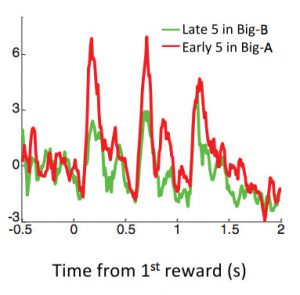Hot Off the Press! – January 2018.
Associative learning is driven by fundamental instructive or teaching signals that reflect errors in the prediction of rewards and other events. Previously dopamine neurons in the midbrain that project widely in the brain have been shown to signal these errors only for value. Here NIDA researchers show that these value errors are a special case of a more general error signal represented in the firing of midbrain dopamine neurons. This signal reflects errors in the prediction of sensory events or features. This expansion of the model puts this critical system in a position to support a much wider array of real-world behaviors than was previously possible.
Publication Information
Dopamine Neurons Respond to Errors in the Prediction of Sensory Features of Expected Rewards. Journal Article
In: Neuron, vol. 95, no. 6, pp. 1395–1405, 2017, ISSN: 1097-4199 (Electronic); 0896-6273 (Linking).

